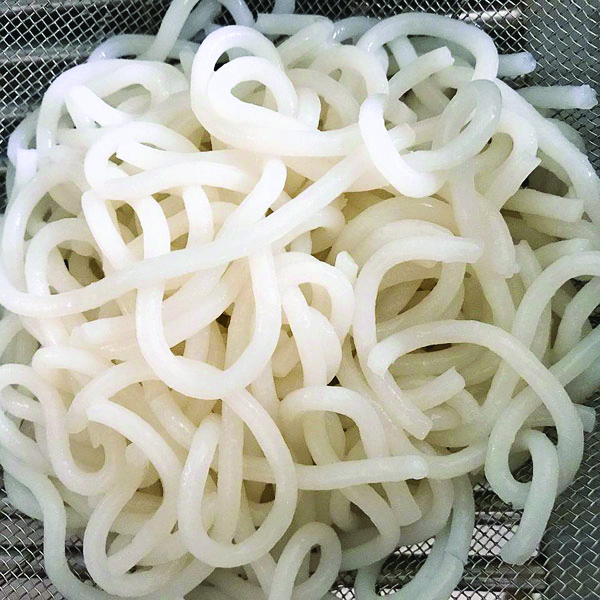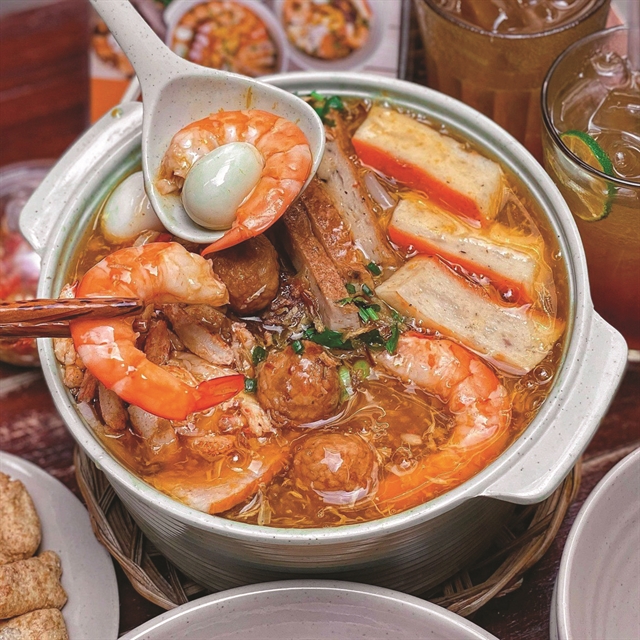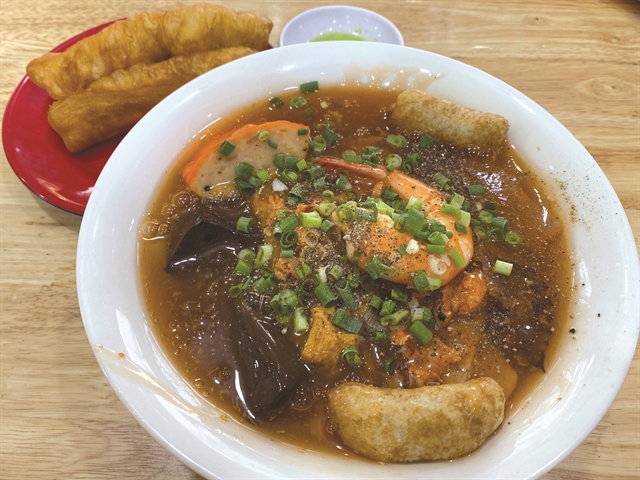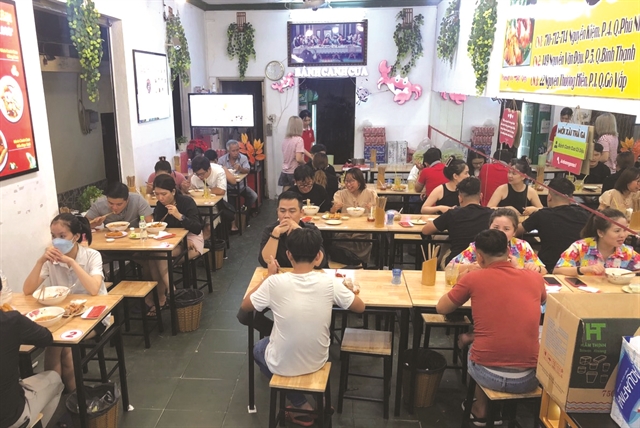Bánh canh cua (crab thick rice noodle soup) is known as a major part of Southern cuisine. It is said to have existed in the twentieth century in Vietnam and was famous for its flavorful red-orange broth.
Crab rice noodle soup (or bánh canh cua in Vietnamese) is known as part of Southern cuisine and is famous for its flavourful red-orange broth.
People do not exactly know when the dish was created. Its origin is believed to be in southeast Vietnam last century, after it made its debut in Trang Bang District, Tay Ninh Province.
Bánh canh (rice noodle) is a traditional dish that is typically served for breakfast. The main ingredient is white, thick and chewy noodle made from rice flour.
 |
| Some of the white, thick, and chewy noodles (bánh canh) are made from rice flour. Those are strands of rice dough boiled in water for a few minutes. – Photo danviet.vn |
Rice noodle is eaten with a flavourful broth made from simmering pork bones with radishes or carrots for hours. Toppings normally include blood puddings, quail eggs, pork belly, and crunchy pork skin. The toppings and flavour are different in different regions.
Bánh canh cua is a variant of bánh canh that retains the basic elements of the original. It is distinct due to its beautiful red, stock-like soup, which is created by a combination of the essential oil of cashew and maize flour. The taste is of the rich flavour of shrimp, crab, and sometimes abalone, as well as pork bone that has been marinated for hours.
Crab, the soul of the dish, is mostly served in two styles, a whole crab and small pieces.
The whole crab will be cooked with the broth. Before being placed in the pot, the chef must remove the crab abdomen and wash in it until no dirt remains.
The other way is with small pieces of crab meat. The chef takes out all the crab meat from the shell and then boils it. Then the finished product will continue to be sauteed with spices until it becomes tender and smells perfectly.
One of the toppings is fabulous white and organ crab bologna. This is made by the mixture of crab meat, minced pork and fat. Depending on the recipe, some secret spices will be added to increase the savoury taste of crab.
Locally well-known restaurant
Đỗ Thanh Long, the owner of the eatery Bánh Canh Cua Bà Ba in District 5, told Việt Nam News that the recipe was passed from his grandma.
“I learned to cook bánh canh cua from my grandma, who has been selling this for thirty years in her hometown. I still keep the old traditional flavour of the broth by using only dried shrimp, pork bones, and egg whip. Our noodle soup has extra toppings like grilled fish, which makes our guests love it,” Long said.
 |
| A pot of ‘cánh canh cua’ that contains 10 different kinds of ingredients. – Photo courtesy of Bánh Canh Cua Bà Ba |
Long’s restaurant has gone viral on many social media platforms and newspapers since the day he started business thanks to many popular videos from food vloggers and articles from journalists.
Nguyễn Hoài Thương, a diner from District 7 who is passionate about this dish, said, “The thing that makes me love bánh canh cua so much is the gorgeous broth. The umami flavour of it contains all of the fresh seafood flavour inside.”
According to Hoàng Thị Minh Hiền, co-owner of Bánh Canh Cua Cô Diệu, a 12-year-old chain restaurant in HCM City, the recipe is passed down from generation to generation, and each ingredient is made by only one family member.
“I remember eating bánh canh cua with my mother at a diner in Thái Bình Market in District 1, which was one of the first places in HCM City to sell the dish; the flavour was unlike any other place that sells this dish until even now in HCM City. I raised our family with the passion to make our own version of bánh canh cua,” Hiền said.
 |
| The umami flavour of ‘bánh canh cua’ comes from the rich fresh seafood ingredients. It has a magnificent red orange broth. – VNS Photo Hồng Linh |
“One of the ways to make good stock flavor is to make the sauce with only seafood, which has made our dish unique. The most succulent crab must come from Vung Tau, where you have some of the best crabs in the country.”
The restaurant is mostly crowded in the afternoon when people are having lunch or dinner.
 |
| Eatery with a bustling nighttime atmosphere. This is the time when people put aside their work for dinner with a flavourful bowl of ‘bánh canh cua’. – Photo courtesy of Bánh Canh Cua Cô Diệu |
Đặng Hữu Thanh Tùng, a university student from An Giang Province, said, “I will never forget the first time I tried bánh canh cua from a vendor in my hometown when I was 11 years old. Right after the first spoon, I knew exactly how much I loved it.”
The price for this lovely dish is around VNĐ50,000 (US$2) to VNĐ300,000 (US$12). – VNS
